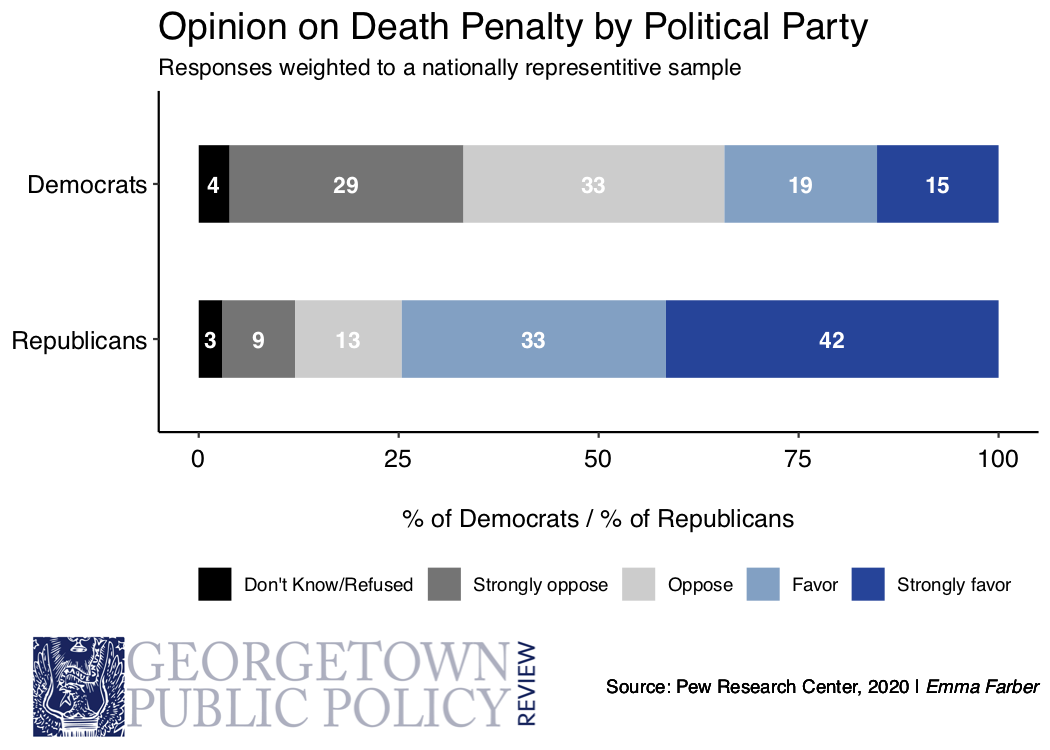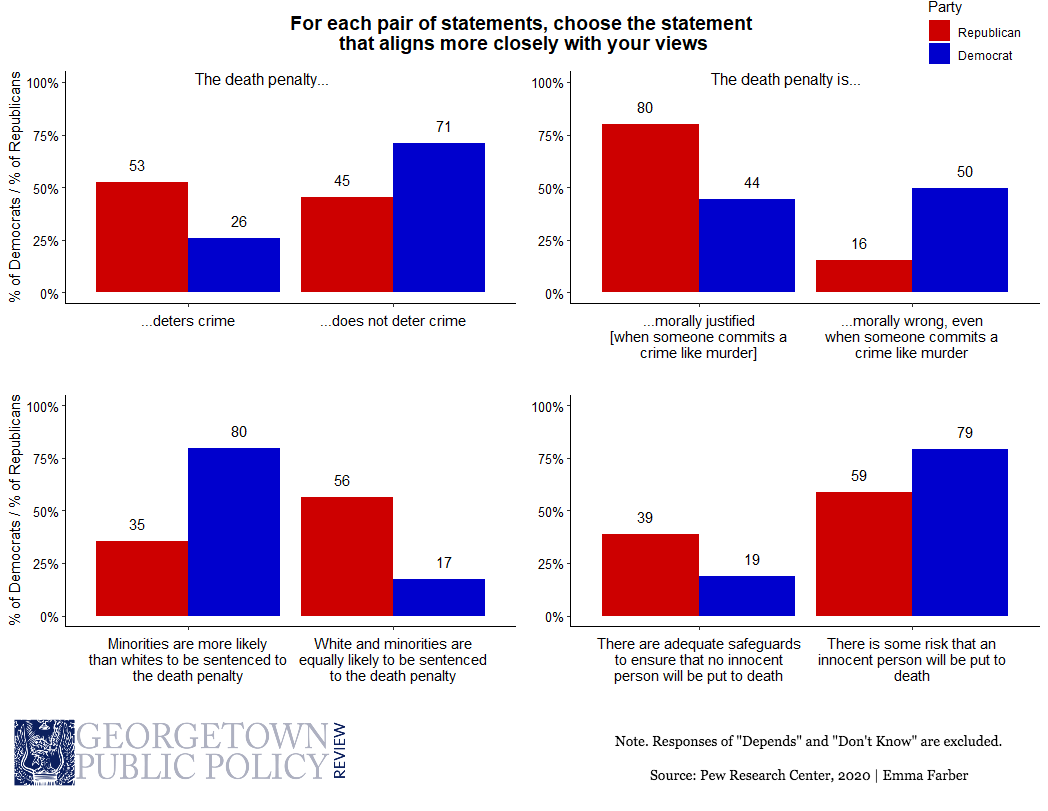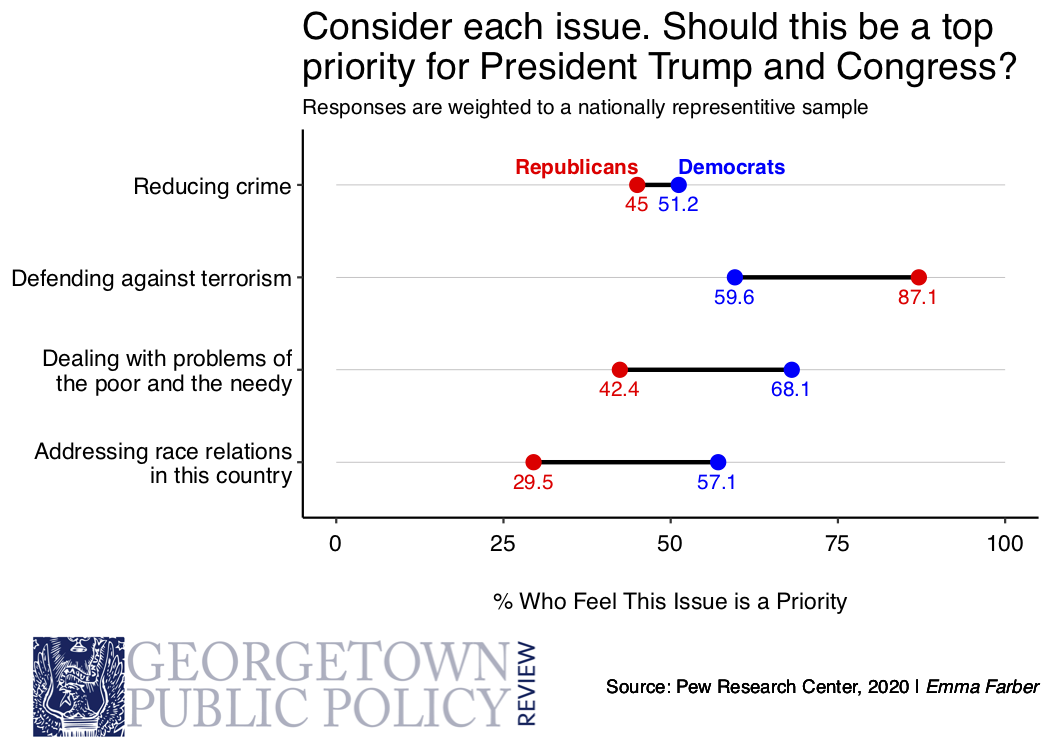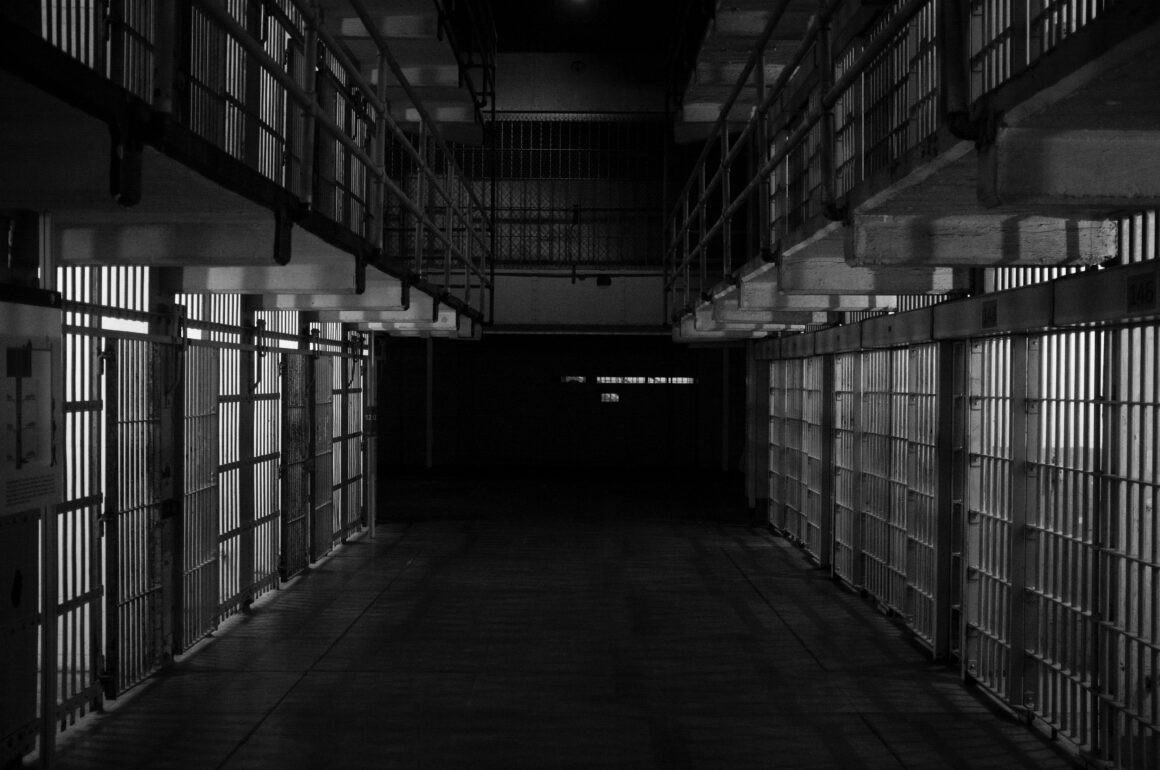Reform advocates in the United States have long pushed for the abolition of the death penalty across America. Using survey data acquired from Pew Research Center, we examine U.S. public opinion on the death penalty and related issues by political party. Democrats tend to oppose the death penalty, and Republicans tend to support it, but there are broadly mixed opinions among respondents of either political party. Respondents generally feel that the death penalty is morally justified in some circumstances, but that it does not deter crime and that it is vulnerable to sentencing mistakes. Reform advocates should consider the commonalities across political parties when drafting policies related to capital punishment.
Current Context
Amnesty International calls the death penalty “the ultimate cruel, inhuman and degrading punishment.” As of 2019, over 100 countries have abolished the death penalty for all crimes. The United States is a notable exception among Western nations – capital punishment remains legal in twenty-eight U.S. states. As individual states have outlawed the death penalty, the number of capital sentences issued each year has steadily declined since its peak in the mid-1990’s, but the U.S. continues to issue dozens of new death sentences every year, with a total of 2,620 citizens on death row as of Jan. 1, 2020.
The death penalty is widely controversial for numerous ethical, legal, and practical reasons. Proponents say the death penalty is the most effective way to deter violent crime, but critics argue that aside from moral concerns, the death penalty is applied unjustly. The Supreme Court acknowledged that the death penalty is applied disproportionately to Black defendants but did not find this disparity unconstitutional. Critics also argue that the system is vulnerable to mistakes, with devastating consequences to innocent Americans: according to the ACLU, “at least one person is exonerated for every 10 that are executed.”
The issue received renewed attention in the final months of the Trump presidency as the administration oversaw the execution of 13 federal inmates, making Trump the “most prolific execution president in more than a century.” Meanwhile, Joe Biden made history as the first winning presidential candidate to advocate for the abolition of the death penalty. Recent surveys have indicated that voters are willing to consider major reforms to criminal justice policies. Politicians and reform advocates may make use of public opinion polls to assess the viability of reforms to or abolition of the death penalty.
Description of Analysis
The goal of this analysis is to assess public opinion of the death penalty across political party affiliations. Reform advocates may use this information to determine policy priorities and anticipate support for or pushback to changes in policies related to the death penalty. This analysis uses data from the Pew Research Center’s January 2020 Political Survey. This survey was fielded from Jan. 8 through Jan. 13, 2020, with a sample size of 1,504. The data was subset to only those respondents who identify with either the Democratic or Republican party (n = 1,356, roughly 90% of respondents). Weights were applied to all summarized values to induce a nationally representative sample.
Key Findings
Support for the death penalty differs substantially by political party, as shown in Figure 1. Most respondents who identify with the Democratic party oppose the death penalty (29% strongly oppose it), and most respondents who identify with the Republican party favor the death penalty (42% strongly favor it). Nonetheless, there is considerable support and opposition on either side of the political aisle: 34% of Democrats favor or strongly favor the death penalty, and 22% of Republicans oppose or strongly oppose it. The controversy of this issue is not decisively split by party lines.
Figure 1 – Public Opinion on the Death Penalty

Democrats are more likely to hold views that align with common arguments against the death penalty. Figure 2 shows the results of several survey questions that examine the nuance of public opinion on capital punishment. For each pair of statements, respondents were asked to choose the statement that aligned more closely to their beliefs (note that Figure 2 excludes respondents who answered ‘don’t know’ or ‘depends’). Most Democrats feel that the death penalty does not deter crime, that it is disproportionately applied to racial minorities, and that there is a risk that innocent people will be executed. However, Democrats do not overwhelmingly oppose the death penalty on moral grounds: nearly half of all Democrats feel the death penalty can be morally justified under certain circumstances.
We see mixed results from Republicans as well. A large majority of Republicans feel the death penalty can be morally justified, but only about half feel the death penalty deters crime, and more than half acknowledge the risk of executing innocent citizens. There is nuanced approval and disapproval for these aspects of the death penalty among both political parties.
Figure 2 – Justifications and Concerns

What may influence respondent opinion of capital punishment? Debates around the death penalty speak to crime reduction policies, autocracy and the philosophy of governing, and class and racial disparities in the criminal justice system. To supplement the analysis of public opinion on the death penalty, Figure 3 presents public opinion on a sample of tangential issues. Respondents were asked to consider a list of issues and select the issues they feel should be a top priority for the current administration. Republicans and Democrats look remarkably similar on the issue of crime: 51% of Democrats feel that President Trump should prioritize reducing crime, compared to 45% of Republicans. Republicans highly prioritize defense against terrorism, which may indicate support for aggressive government policies related to crime and safety. Democrats prioritize helping the poor and addressing race relations much more than Republicans, indicating that Democrats may be more sympathetic to arguments that the death penalty disproportionately affects poor and non-white defendants. Note this survey was fielded in January 2020, prior to the 2020 upsurgence of the Black Lives Matter movement, which likely affected public opinion on crime, policing and race relations.
Figure 3 – Policy Priorities

Conclusion and Recommendations
Given that average support for the death penalty is substantially higher among Republicans compared to Democrats, this issue has a clear partisan skew. Nonetheless, there is support and opposition for this policy on either side of the political spectrum. Though most Republicans surveyed support or strongly support the death penalty, nearly six in ten believe there is a risk of executing innocent people. Sixty-two percent of Democrats oppose or strongly oppose the death penalty, but nearly half of Democrats believe it can be morally justified.
Reformers and politicians who advocate for the abolition of the death penalty may be enthused by strong Democratic opposition for the policy. However, they should consider which arguments may be most appealing. Democrats seem split on the moral justification of the death penalty, but a majority can agree with certain arguments: it does not deter crime, it disproportionately impacts minorities and it is vulnerable to grave mistakes of executing innocent people. These arguments may be especially appealing in the present policy moment: more than half of Democrats surveyed feel the nation should prioritize addressing race relations and helping the poor, issues that have increased in urgency in 2020 in the wake of the George Floyd protests and COVID-19 pandemic.
Proponents of the death penalty may feel secure in the large swath of Republican support, and they may be equally wary of strong Democratic opposition. These proponents should consider the aspects of death penalty policies that people across parties can agree on. Despite Republican support for the death penalty on the whole, many Republican respondents were skeptical of the policy’s ability to deter crime and safeguard against the execution of innocent people. Proponents may consider moderate reforms to the death penalty to appease these concerns and maintain Republican support.
The totality of the analysis indicates that both Republicans and Democrats oppose and support certain arguments within the death penalty debate. Decision-makers should consider the timeframe of the survey fielding before acting on these findings. Though data is relatively recent (January 2020), there have been large movements related to criminal justice and racial disparities than may have swayed public opinion since the survey was fielded.
Photo by Emiliano Bar

Now do a poll on whether you’re in favor of the death penalty for a life-long thug who anally raped your spouse and three daughters, then killed and dismembered them all.